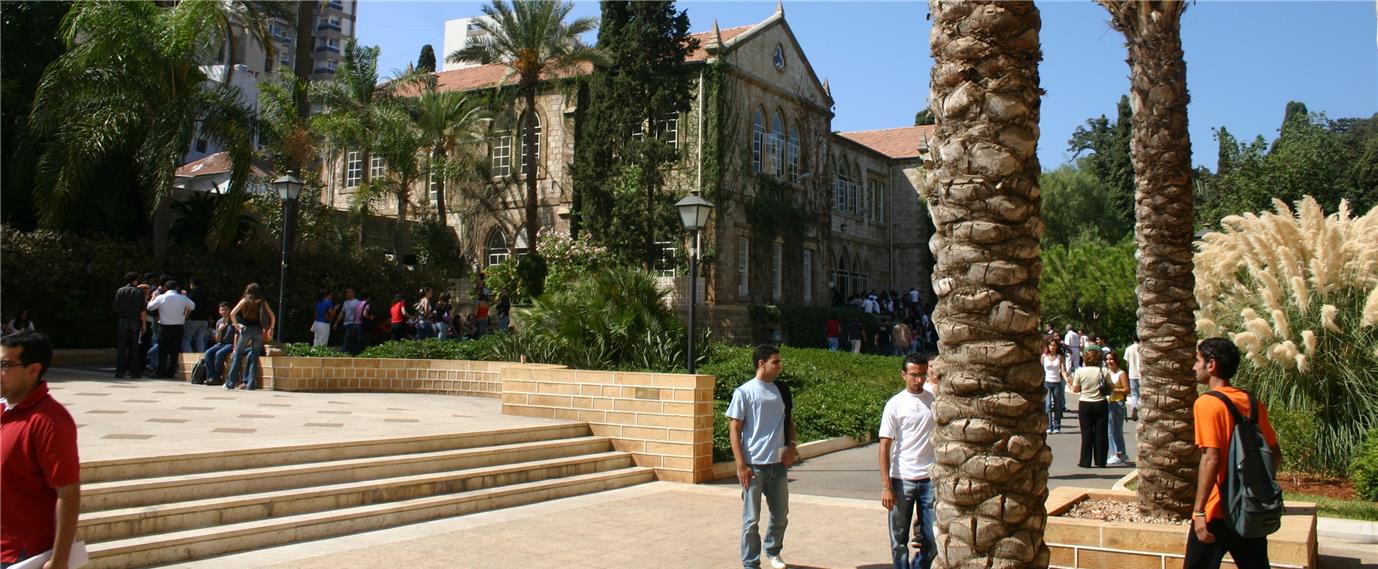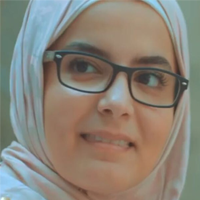يُعتبر لبنان من أوائل الدول العربية، التي عرفت صناعة الإعلام وتعليمه، وصدرت منها دوريات صحفية، وخرّجت أقلاماً لا تزال أسماؤها محفورة في التاريخ. وقد شهد العقدان الأخيران، مثله مثل عدد من الدول العربية، توسّعاً في قطاع الإعلام، متأثراً بالتطور التكنولوجي، وربما نتيجة لإدراك منافع وسائله في تحقيق غايات متعددة، قد تكون تجارية أحياناً، وسياسية أحياناً أخرى، وسط نظام طائفي.
ومع أنّ معظم الطلاب يتوجّهون لدراسة اختصاصات توفّر لهم مكانة اجتماعية تقليدية كالطب والهندسة والحقوق، فإنّ عدد الدارسين للإعلام شهد ارتفاعاً في السنوات الأخيرة عنه في السابق. وتشكّل نسبة الطلاب في تخصّصات الإعلام، حوالى 2,5 % من مجمل الطلاب في الجامعات في لبنان، بحسب دراسة صدرت في العام 2009 حول الصحافة والدراسات الإعلامية، أجراها رئيس قسم الإعلام في الجامعة اللبنانية الأميركية الدكتور جاد ملكي.
وبحسب الدراسة، توفّر 9 جامعات من أصل 41 جامعة معتمدة من قبل وزارة التربية والتعليم العالي، تخصصات في الإعلام، هي إضافة للجامعة اللبنانية (عامة)، الجامعة الأميركية في بيروت والجامعة اللبنانية الأميركية وجامعة سيدة اللويزة وجامعة البلمند وجامعة الجنان والجامعة الأميركية للعلوم والتكنولوجيا والجامعة الأميركية للتكنولوجيا وجامعة بيروت العربية، (أضيف إليها الجامعة اللبنانية الدولية).
هل تطوّر الجامعات نفسها؟
ومع ما يشهده قطاع الإعلام من تطورات متسارعة، فرضتها الابتكارات التكنولوجية، يبرز سؤال، بل أسئلة عن مدى ملاحقة الجامعات لهذه التطورات، ومواكبتها في مناهجها وبرامجها التدريبية إن وجدت، وتزويدها لخريجها تنمية لمهاراتهم.
وفي هذا الإطار، ترى الباحثة وأستاذة الإعلام والتواصل بجامعة سيدة اللويزة، ربا الحلو أنّ "تطوير الجامعات لنفسها بطيء جداً أمام حتمية تكنولوجية فرضها تأثير التكنولوجيا على الإعلام"، مشيرة إلى أنّ "معظم الجامعات تعتمد على مناهج قديمة، أغلب مضمونها معرّب ويستند إلى ترجمات غير دقيقة، كون مفاهيم الإعلام هي مفاهيم وضعها متخصصون غربيون ولم يساهم فيها العرب".
وبينما تستند معظم الجامعات على مقرّرات نظرية في مناهجها الخاصّة بالإعلام، يتبنّى عدد محدود منها برامج تدريبية في مراكز تابعة لها، أو تفرض على طلابها ساعات تدريبية في وسائل إعلامية.
تؤكد الحلو على أهمية التمييز بين الإعلام الذي يشمل مجالات واسعة كالعلاقات العامة والإعلان وصناعة الأفلام والإخراج وبين الصحافة، مشدّدة على أنّ الصحافة "علم وتطبيق"، آسفة لإهمال معظم الجامعات للجانب العملي.
فجوة بين مرحلتين:
ولعل من تخرّج من هذا التخصّص، مرّت على مسامعه عبارة إنّ ما يُدرس في الجامعة شيء، وما يطبّق في سوق العمل شيء آخر. وترى الصحفية المخضرمة والأستاذة السابقة في الجامعة الأميركية والجامعة اللبنانية الأميركية، ومديرة "إعلام بلا حدود" ماجدة أبو فاضل أنّ تلك "الفجوة" تبدأ من المناهج الجامعية، الشبيهة بـ"معلّقات عصر الجاهلية". وتستغرب أبو فاضل أنّ "معظم مواد الجامعات يدرسها أساتذة لم يمارسوا المهنة، ولم يعملوا ميدانياً، ولم يديروا غرفة أخبار"، مشيرة إلى عدم التواصل والتنسيق بين الجامعات وأرباب العمل لمعرفة احتياجات السوق.
وبدوره يؤكد ملكي، صاحب الدراسة أعلاه، على ضرورة اعتماد تدريس الصحافة على الجانبين النظري والعملي، إضافة إلى البحث العلمي والتفكير النقدي، لافتاً إلى أنّ معظم مقرّرات الجامعات لم تتطوّر لتواكب وسائط الإعلام المتعددة، كتعليم صحافة البيانات والتدريب على أساسيات إنشاء الصفحات الإلكترونية وتقديم مضمون خبري قصصي ومحتوى تشاركي يراعي شكل النص وأهمية الصورة والفيديو. كما يشير ملكي إلى أنّ المقرّرات بمعظمها لا تزوّد الطلاب بمهارات تمكّنهم من التخصص بتغطية مجالات معيّنة كصحافة العلوم وصحافة الاقتصاد وصحافة الثقافة وغيرها.
مدير مركز الإعلام في جامعة بيروت العربية إبراهيم شهاب، يرى أنّ باستطاعة معظم الجامعات تقديم المزيد لا سيما لناحية التدريب العملي، لكنّه يأسف لعدم إدراك أهمية هذا الجانب من قبل القائمين على الجامعات أحياناً، ومن قبل الطلاب أحياناً أخرى. ويلفت شهاب إلى عنصر الطلاب في معادلة اكتساب المهارات الإعلامية خلال سنوات الدراسة الجامعية، مشيراً إلى أنّ مستوى المقبولين في هذا التخصّص، غالباً ما يكون "دون المستوى المطلوب".
ويرى شهاب أنّ المركز التدريبي بالجامعة يطوّر غرفة التحكّم المخصصة لتدريب الطلاب، ومعداته من كاميرات وأنظمة تشغيل، لكنّه يسأل "هل الطلاب مؤهلون؟" لافتاً إلى تدنٍ بمستوى إتقانهم للغات سواء العربية أو الأجنبية، ومستواهم الثقافي بشكل عام.
ومن جهتها توافق الحلو، أنّ هناك ضعفاً في قدرات المدرَسين بتخصّصات الإعلام، الذين بمعظمهم "لم يمارسوا المهنة ويعملون فقط من وراء مكاتبهم"، مشيرة إلى أنّ العاملين في مجال الصحافة، يجب أن يخضعوا للتدريب بشكل دائم، مهما كان عمرهم، فهم كما تلفت، متدربون "دائمو التعلّم" Lifelong learners .
وتلاحظ الحلو، أنّ معظم الطلاب في قسم الإعلام يجنحون نحو حب الظهور، في وقت يفتقدون لمهارات أساسية، ويعانون ضعفاً في مهارات الكتابة والقراءة والبحث، وترى أنّ عليهم ألا يكتفوا فقط بما يتلقونّه من أساتذتهم، "فالأستاذ هو مجرّد وسيط بين المعلومة والمتلقي".
وتشدّد الحلو على أهمية تثقيف الطالب لنفسه، والخروج من دائرة الانتماء السياسي أو الطائفي، والتفكير نقدياً عبر محاولة القراءة بين السطور، والتمييز بين الخبر والرأي، والحقيقة والبروباغندا، مشيرة إلى أنّ معرفتهم القيم الأساسية وأخلاقيات المهنة، تنعكس على أدائهم مستقبلاً.
بدورها تقول أبو فاضل إنّ "خريج الصحافة والإعلام لم يكتسب فعلياً المهارات اللازمة لممارسة المهنة، لأنّ الشطارة ليست فقط في التمسّك بالقشور، مثل الهرولة وراء أحدث تكنولوجيا أو أجهزة تواصل، بل في معدن وأساس المهنة أياً تكن المنصّات". وترى أبو فاضل بدورها لدى الطلاب "تراجعاً كبيراً في إتقان اللغات، ونقصاً شنيعاً في تفكيرهم النقدي، وشبه انعدام بمعلوماتهم العامة، ناهيك عن الأخلاقيات التي اختفت كلياً، أما بديهيات الأمور كالدقة في نقل المعلومة والتوازن والتأكد من المصادر في ظل كل ما ينشر عبر مواقع التواصل الاجتماعي، فعليهم السلام".
من المسؤول؟
وفي ظل ضعف إمكانات الإعلام الرسمي وانتشار وسائل إعلام مملوكة من سياسيين أو أحزاب في لبنان، أصبح من السائد استعانتها بخريجي إعلام وأحياناً خريجي تخصّصات أخرى لا يمتلكون مهارات كافية، لكنّهم يحقّقون هدف القائمين عليها، سياسياً وطائفياً، في حين قد يبقى خريجون مؤهلون على الهامش، نظراً لعدم انسجامهم مع هذه الأهداف، وتمسّكهم بمعايير مهنية، لم تعد لها الأولوية عند قائمين على هذه الوسائل.
لكن ألا تتحمّل وسائل الإعلام خطيئة الزج بإعلاميين غير مؤهلين في الواجهة؟ ترى أبو فاضل أنّ "الجميع مسؤول، فالإعلام بطبيعته يريد استقطاب الجمهور، لكن في زمن التقشّف وتراجع الإيرادات، والتحوّل إلى الإعلام الإلكتروني والجوال والتفاعلي هناك حاجة كبيرة لتغيير ذهنية أصحاب الشأن". وتؤكد أبو فاضل أنّ هدف أيّ وسيلة إعلامية هو "إفادة وتنوير القارئ والمستمع والمشاهد والمتصفّح، وليس صاحب الجريدة والمحطة والموقع"، وتأسف لأنّ هناك أيضاً "عوامل أخرى تحدّ من تحسين الأوضاع في هذا القطاع كالمصالح السياسية والطائفية والاقتصادية".
من جهتها تضع الحلو مسؤولية ما تصفه بـ"التشخيص المرعب" للوضع الإعلامي في لبنان، وتراجع مستوى المهارات المطلوبة، في سياق "غياب السياسات العامة للدولة التي تراعي حقوق المواطن، لا سيما منها حق الوصول إلى المعلومات وامتلاك الإنترنت، ومنها عدم إقرار سياسات إعلامية وقوانين عصرية، فضلاً عن غياب دور مجموعات الرقابة المتخصصة "watchdogs"، والنقابات التي يجب أن تحمي الصحفيين وتصوّب أداءهم، في ظل نظام محاسبة شامل".
أما ملكي فيحمّل الجامعات المسؤولية بالدرجة الأولى، لا سيما لجهة "الاعتماد في العملية التعليمية على أساتذة توقّف بهم الزمن عند المرحلة التي أنهوا خلالها دراساتهم العليا، ولم يعودوا مدركين للتحديات التي تواجه صناعة الإعلام"، مشيراً إلى خطورة الاعتماد على من يسمّيهم بـ"الدخلاء" على مهنة الإعلام، وأساتذة غير مهيئين لم يمارسوا المهنة.
مراكز تدريبية "بديلة"
أمام هذه الفجوة بين المرحلة الأكاديمية والإنتاجية بالعمل، يرى خريجون أنفسهم في سوق تنافسي، مفتقدين لمهارات أساسية لا تخوّل معظمهم المباشرة بممارسة المهنة بمجرّد تخرّجهم من الجامعة.
ولعلّ المراكز التدريبية، التي أسّس عدداً قليلاً منها إعلاميون متخصصّون، استغلّت هذه النقطة، وعملت في المقابل على تشكيل جسر عبور لملء الفراغ بين العالم الأكاديمي وعالم صناعة الإعلام. وتؤكد الإعلامية الدكتورة في جامعة سيدة اللويزة مي شدياق، بعد تأسيسها مؤسسة تدريبية باسمها، أنّ "الهدف هو إعداد برامج تدريبية تساعد الخريجين على تطوير قدراتهم وتأهيليهم للانخراط في ميدان العمل، من خلال استخدام تقنيات حديثة واستديوهات مجهزة".
ويستقبل المركز خريجين غير متخصصين بالإعلام، لكنّ شدياق تدافع عن ذلك، لافتة إلى تزويد هؤلاء بمهارات إعلامية تساعدهم على تغطية قصص تعني مجالهم، مثل صحافة الأعمال، والصحافة القضائية، وغيرها، بدل عودتهم لدراسة تخصص جديد من البداية.
وترفض شدياق اعتبار ما تقدّمه المراكز التدريبية بديلاً عن التعلّم الأكاديمي والنظري، مشيرة إلى أنّ الأساس هو "التكامل" بين الجامعات وهكذا مراكز. وتشدّد على أنّ "خريجي الإعلام بحاجة لتنمية قدراتهم مهما تعلّموا بالجامعة، وإضافة خبرات جديدة على سيرتهم الذاتية". وتلفت إلى أنّ التدريب يجب أن يتمّ على أيدي متخصّصين بهذا المجال مارسوا المهنة ولم يكتفوا بالتعليم النظري، "إذ ليس من السهل إعطاء وقت كاف من المدرسين لصقل مهارات كلّ الطلاب في الجامعة مقارنة بالدورات التدريبية".
لكنّ ملكي يعود ويلوم الجامعات، معتبراً أنّ "مجرّد وجود مراكز تدريبية هو دليل على أنّ الجامعات لا تخدم الطالب وتفشل بمهمتها الأساسية". ويأسف لأنّ "طلاباً يُجبرون أحياناً على دفع مبالغ باهظة خلال دراستهم الجامعية في جامعات خاصة، ثم يجدون أنفسهم مضطرين للالتحاق بدورات تدريبية تزوّدهم بمهارات يعوزونها".
البقاء للأفضل
وإضافة إلى الركائز النظرية والعملية، يشدّد ملكي على ضرورة تربية دارسي الإعلام "تربية إعلامية"، تحثّهم على التفكير النقدي، واستخدام المهارات الرقمية، والتركيز على تغطية مواضع تظهر التمييز الجندري والطائفي وغيرها.
بدورها تشدّد أبو فاضل على "ضرورة الاهتمام بالبحث والتعمّق في المواضيع المغطاة"، مشيرة إلى أنّ "الأخطاء التي ترد في النشرات والتقارير والتحاليل لا تحصى وهذا غير مقبول، ولا أَجِد من يعترف بها، ونادراً ما يتم تصحيحها".
ويؤكد شهاب من جهته على أنّ "القيم الفنية والفكرية تبقى أساسية ويجب تزويدها للطلاب، ولذلك فإنّ وسائل الإعلام الحديثة ليست بديلة عن وسائل الإعلام التقليدية"، مشدّداً على "ضرورة تدريب الطلاب على الاهتمام بالمحتوى الإعلامي، في ظل إعلام لا يعكس صورة المجتمع، ويعمد إلى مخاطبة الغرائز أو التركيز على غايات سياسية، وينجح تقنياً في تطبيق نماذج برامج أجنبية، لا تعبّر بالضرورة عن معظم اللبنانيين".
أما الحلو فتؤكد على قيم "التدقيق بالمعلومات والمصادر، وتقديم المسؤولية على السرعة، أو snail journalism، والتفريق بين الخبر والخلفية والرأي، والتدريب على مفهوم الإعلام المجتمعي بعد اندثار الإعلام الجماهيري، والاهتمام بالمحتوى الرقمي لناحية الجذب وطريقة العرض وتأمين معلومات غنية في الوقت عينه"، لافتة إلى أنّ البقاء للأفضل ولمن يستطيع مواكبة ثورة التكنولوجيا.
أمام هذا الواقع بين مهارات مفتقدة في الجامعات، وقيم تتجاوزها وسائل إعلام، يبقى التعويل على أساتذة متخصصين ربما وجدوا بعد سنوات خبرة من ممارستهم المهنة، تجربة جديدة تفتح لهم الباب أمام تحدّي نقل مكتسبات نظرية ومهارات عملية قد لا تتوفر في الكتب، إلى جيل جديد، مزودين بحصيلة خبرات في الحياة وبالميدان وبين الناس، وأحياناً حتى في مؤسساتهم الإعلامية.
وعلى الجانب الآخر يبقى التحدّي الأكبر، اكتساب طالب الإعلام لمهارات متعددة، وبناء نفسه ومعرفته على أساس سليم ومواكبة كل جديد، في مجال يشهد تقدّماً أحياناً في بعض جوانبه إلى الأفضل، وأحياناً تراجعاً نحو الأسوأ، لكنّه حتماً ليس ثابتاً... ودائم التغيّر.








































